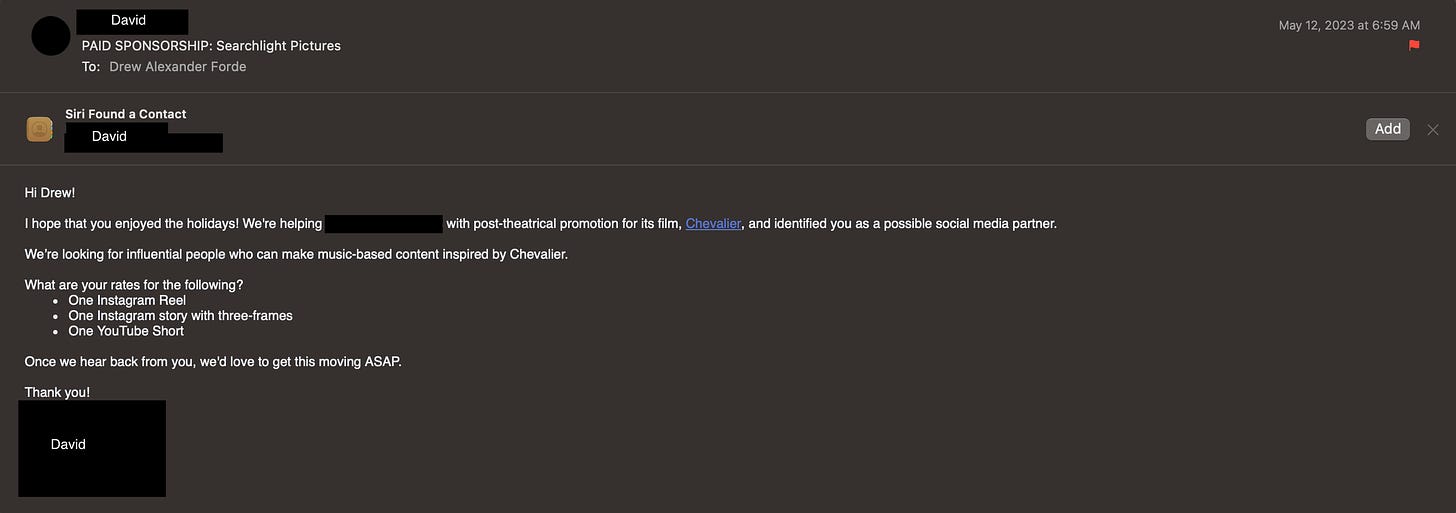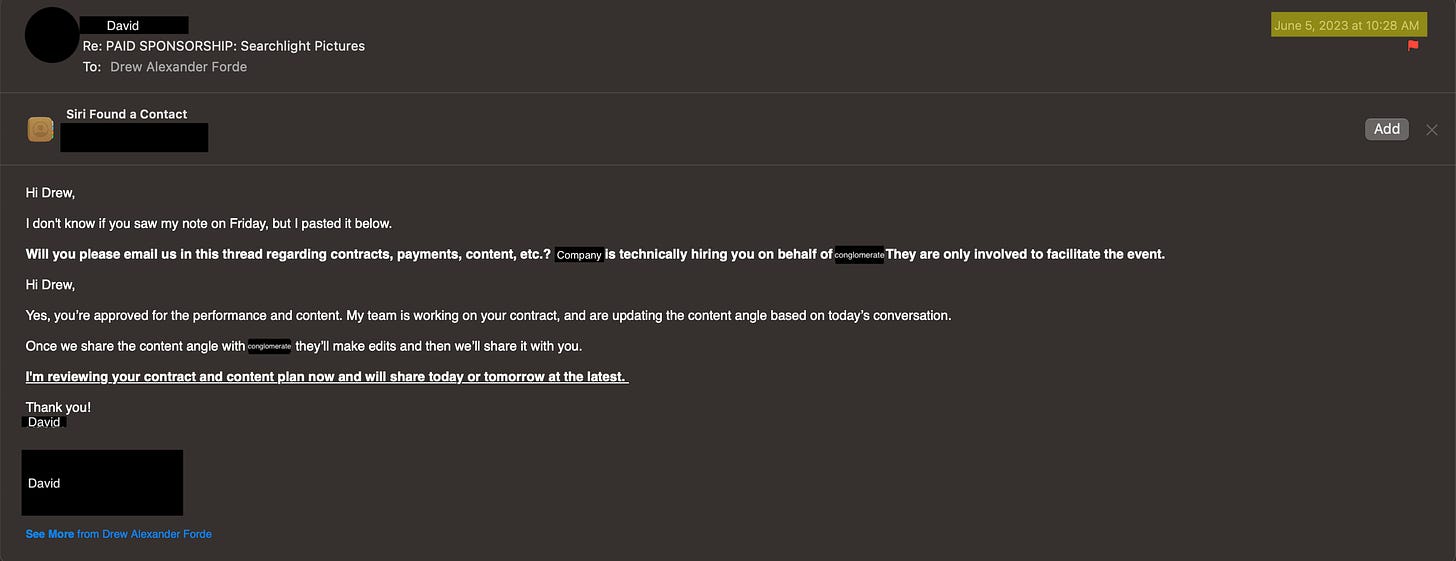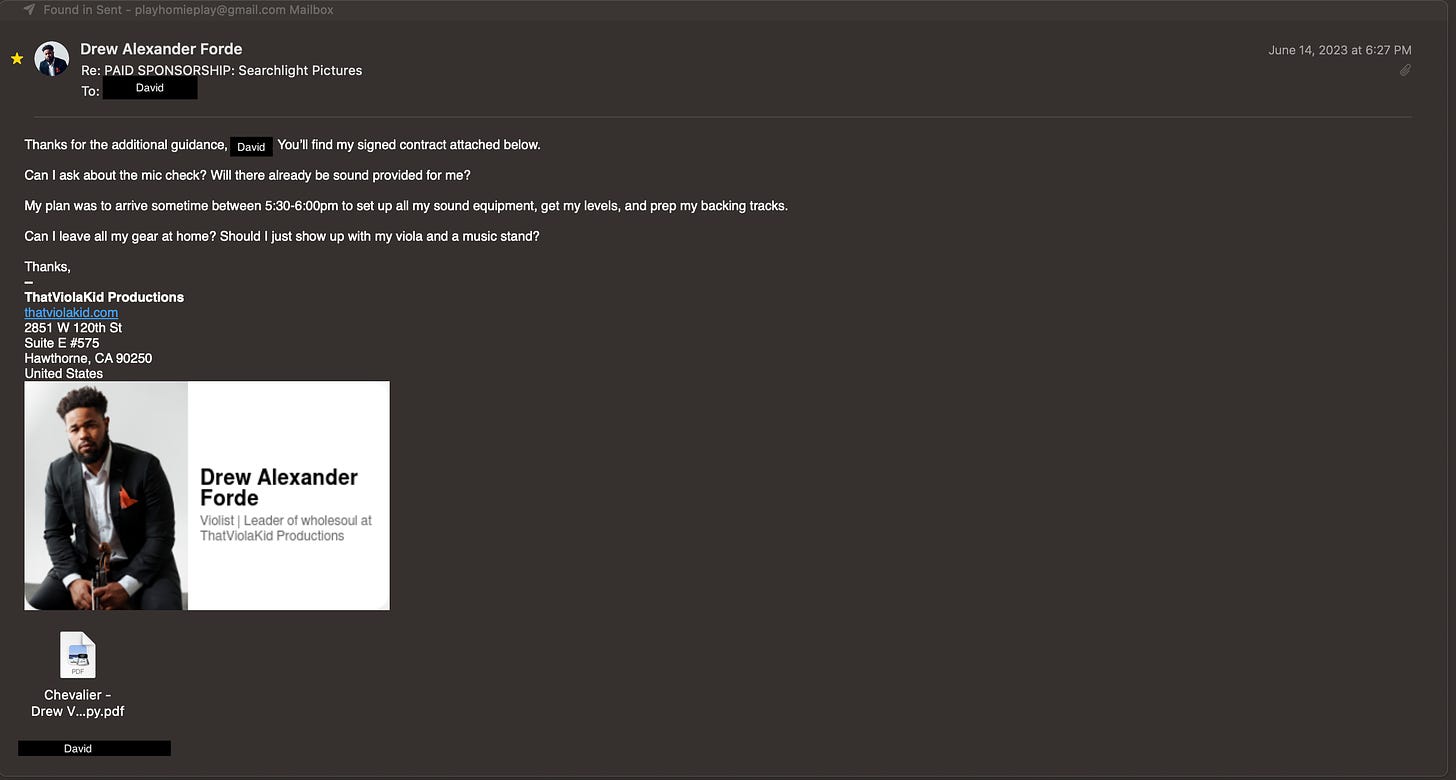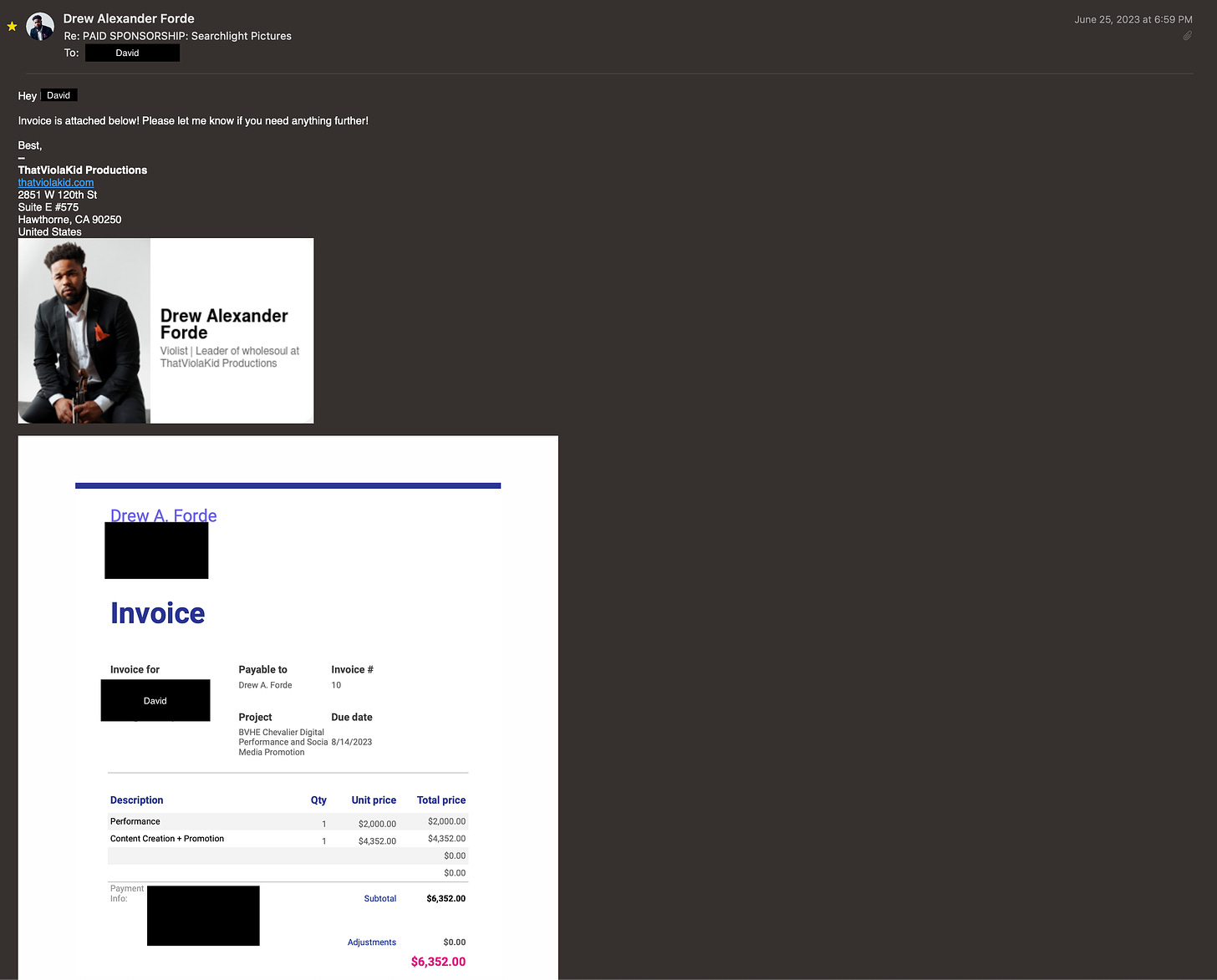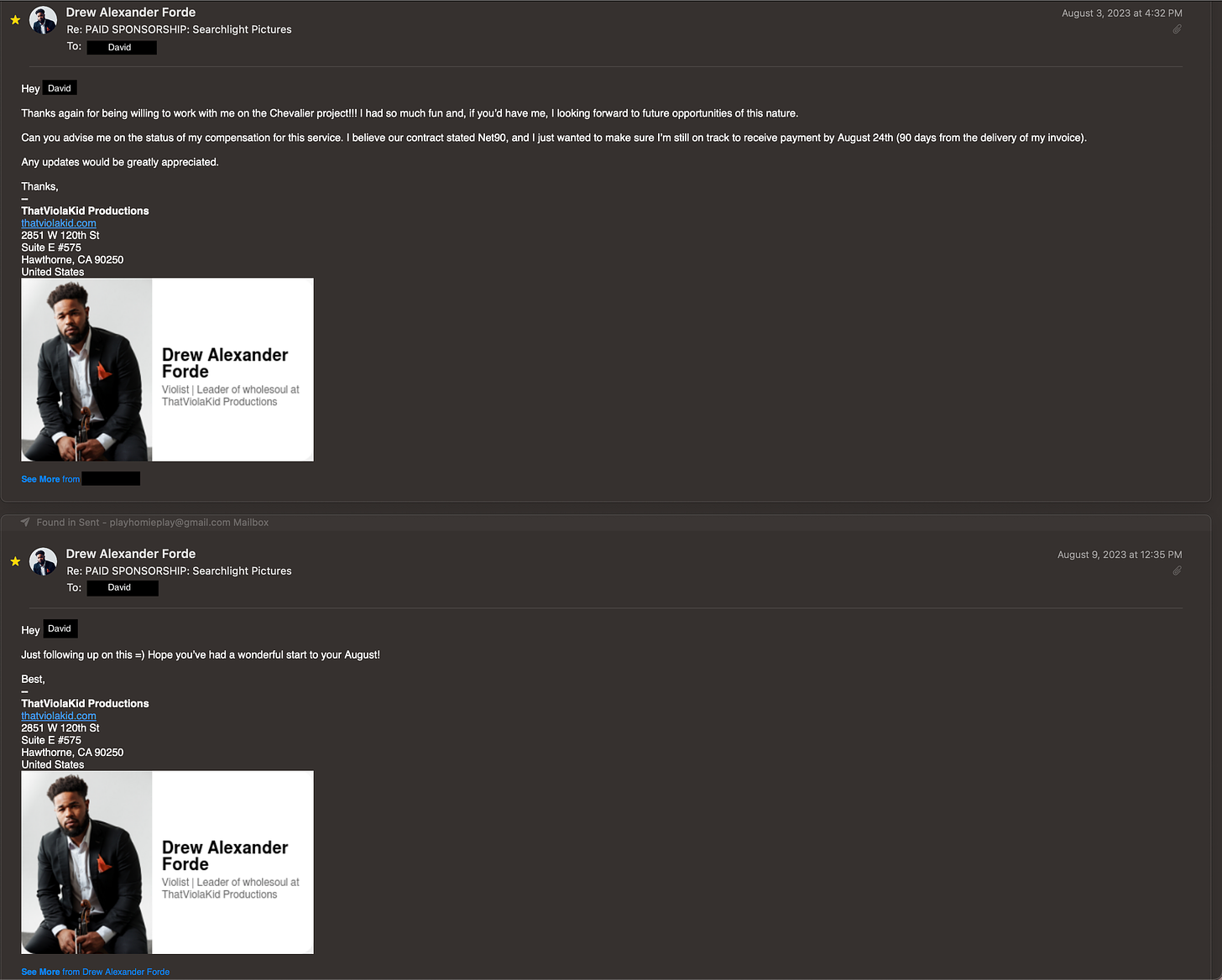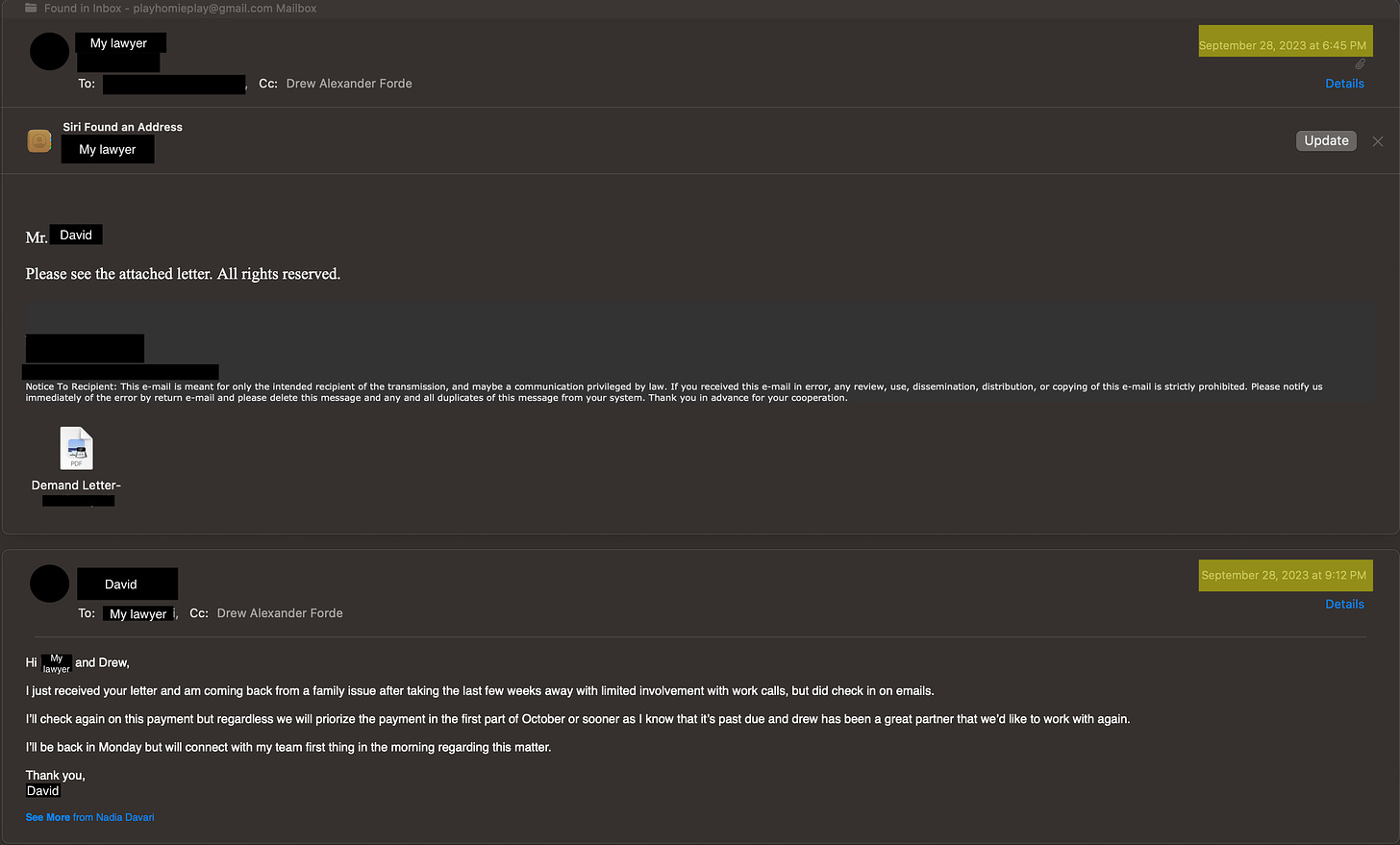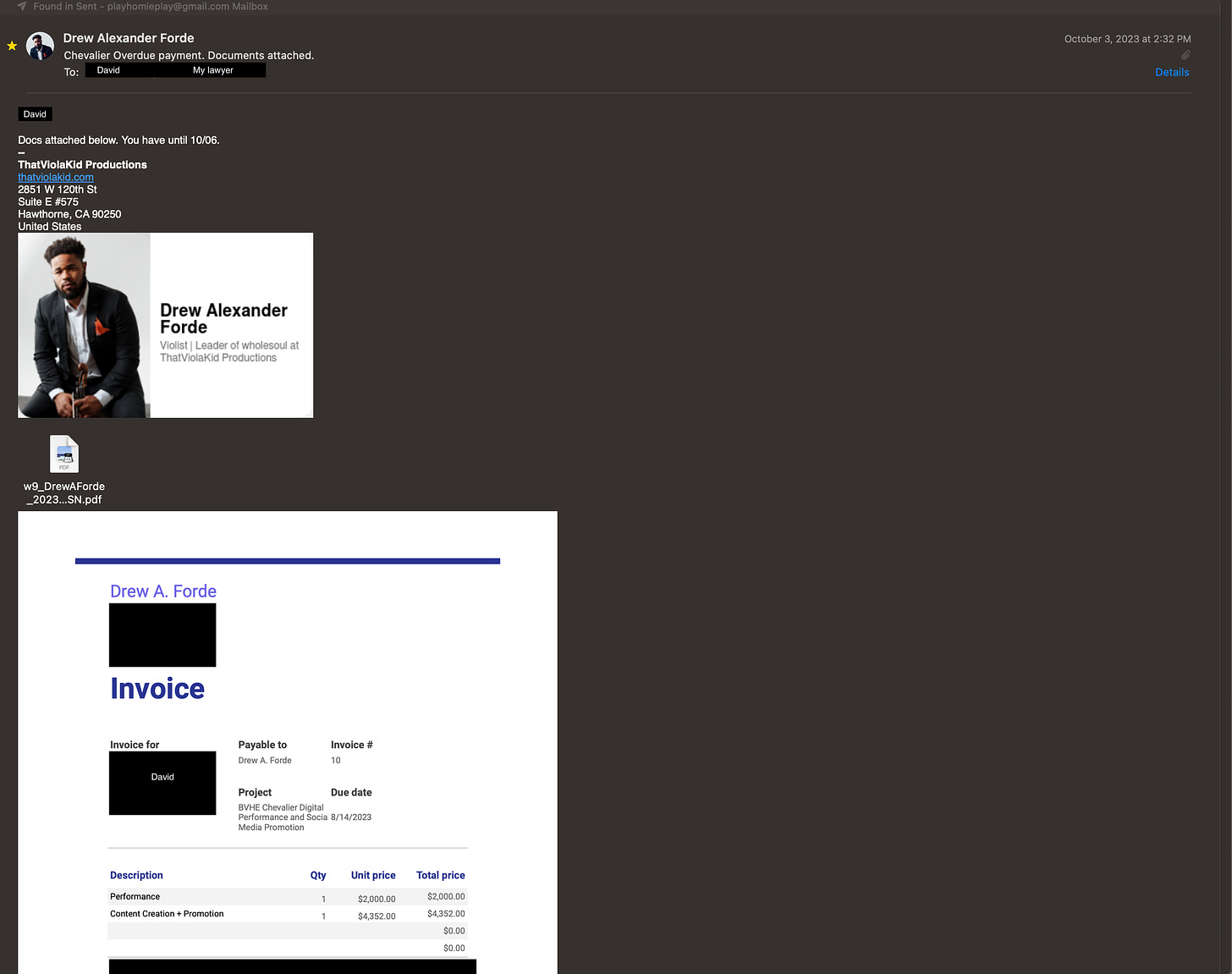Disclaimer: None of this is legal advice. In this newsletter, I disclose the process that I used in my specific situation with my specific jurisdiction. Do not blindly follow the ramblings of a random internet violist. Before taking any legal action, always consult a legal professional.
Contracts only have power if you enforce them.
If you do not learn this lesson, business will be challenging for you.
Without contracts, people are free to operate however they please.
Hell, even WITH contracts, people will jump through hoops in order to avoid upholding their agreements.
How do I know this?
Last year, I filed a small claims suit against a company for breach of contract.
I was hired to perform, produce, and promote. Even though I upheld my end of the bargain, the person that hired me did everything in his power to avoid paying me.
I wasn’t having that. I went after my money, and I won…kinda.
I was lucky. This could have been even more of a nightmare.
I spent a lot of money.
I did my homework, as you’ll soon see.
But best of all, I did not have to go to court
My life for the past 17 years has been an experiment.
My hypothesis: I can thrive in this life by playing my Viola and making music.
This newsletter is where I collect the evidence, test my theories, and digest my mistakes and lessons.
By the end of today’s newsletter, you will understand 2 things:
When it is worth it to pursue legal action upon breach of contract.
How to open a case in the state of California (and what to search for if you live somewhere else).
Bookmark this post and read on.
I hope you never have to use it.
Last thing before we begin, I need to establish 3 things:
The story I am sharing is the abridged version. There are many more screenshots and conversations that I will not have time to cover.
I cannot share any screenshots of my contract because of confidentiality clauses in the contract.
I have made all entities involved anonymous for cleanliness. My goal for this newsletter is to be a case study, not a takedown piece.
Grab a cup of tea and get cozy. =)
Story
The story starts with this email: 06:59 May 12th, 2023.
Stoked for the chance to perform an influencer gig, I eagerly responded.
Here’s a quick rundown of the cast of this story:
David is the owner of <company>. <Company> is being sponsored by <media conglomerate> to put everything together.
<Media conglomerate> is the big daddy running the running the show. Like a proper absentee father, they were mostly hands-off during this performance. You would know this company.
<My lawyer> is my legal counsel during this period of time.
This is how it would go down:
I would provide 2 services: live performance and social media content creation.
David, sponsored by <media conglomerate,> was tasked with hiring talent (me) to perform for a screening of the movie Chevalier.
Furthermore, using content created from this event, the I would then be tasked to create a promotional ad for the digital release of the movie.
David’s job is to work directly with me. He would approve my content for the social media ad, act as my liaison to <media conglomerate> and pay me for my services.
A couple of days after initial contact with David, he connects me with employees of <media conglomerate>.
<Media conglomerate> <Company> is being sponsored by <media conglomerate>We discuss sound and wardrobe, and it goes off without a hitch.
Let me stop here and say this: David was cagey throughout the whole process. Communication was slow and labored. Whenever I would bring up compensation, David would dodge or ignore my questions.
This continues dance continues even after I finishing planning with <media conglomerate>.
At this point of the communication, I was still very confused.
Who was responsible for paying me? What I would actually be doing?
I asked <media conglomerate> if they could help me out.
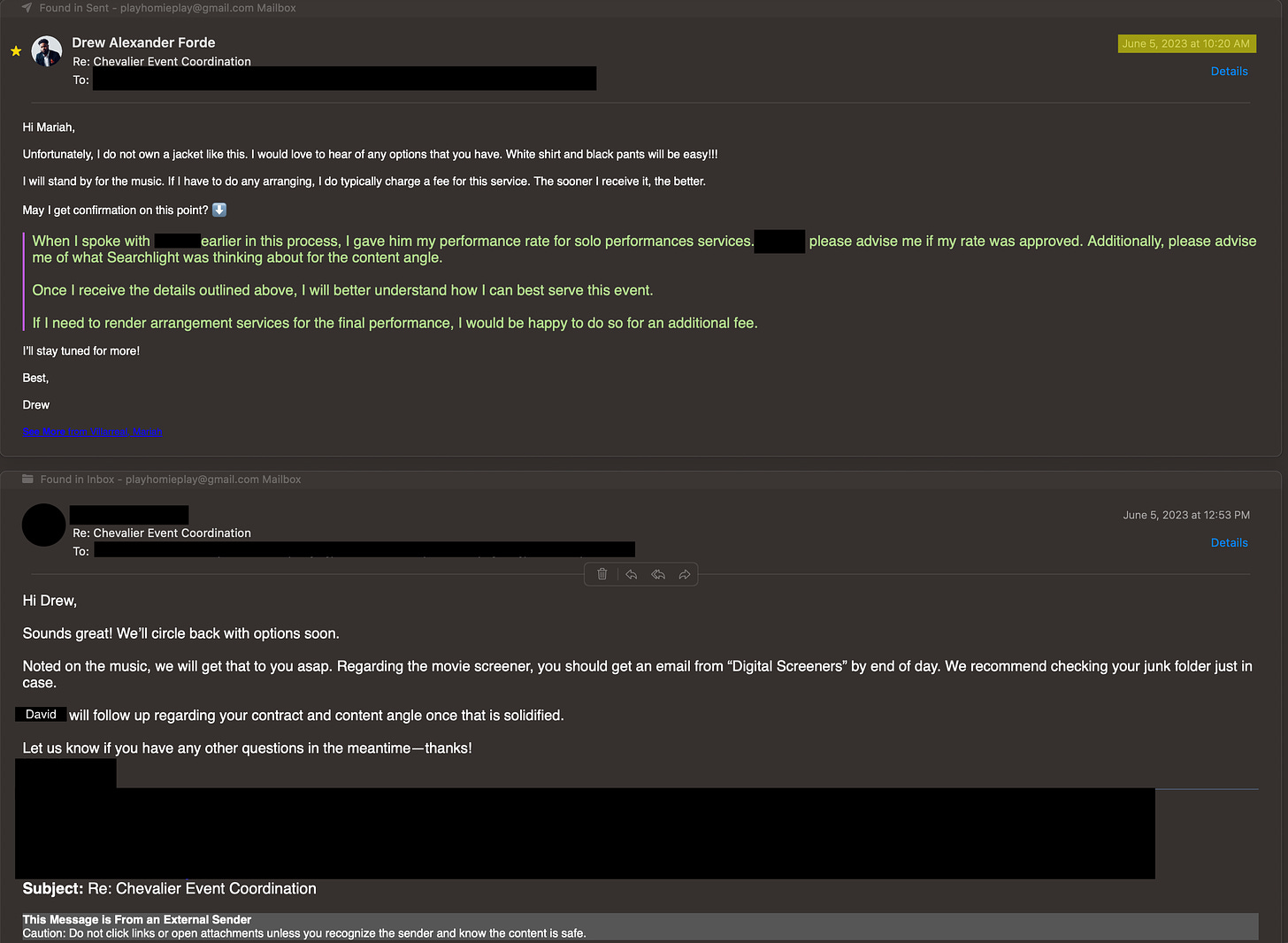
This screenshot establishes that David is the one responsible for paying me, which was not clear to me until this moment. Finally, some answers.
But then, BOOM. David emails me this 8 minutes later and in a separate thread:
3 things are wrong with David’s email here.
He never sent me a note (on Friday) about payment. I double and triple checked. He’s lying here.
“Will you please email us in this thread regarding contracts, payments, content, etc…” is sus AF!! Why would we keep <media conglomerate> out of the loop?
David did not send my contract “today or tomorrow at the latest.” He delivered it on June 8th, 2-3 days late.
When David finally sends me the contract, we negotiate. I signed the contract and sent it back on June 14th.
I’m still angry as I write this. Leading up to the day before the gig:
I did not know where it was.
I did not know what time I should arrive
I did not know if I needed to provide sound equipment or if it would be provided onsite.
Contract was signed and we were in business.
Here’s what happened next:
I played the gig as contracted. Additionally, I used the content from the performance and created an ad for the promotion.
I submitted my first drafts of the content with captions. At David’s direction, I make the changes he requested.
I post everything. You can see my original post here.
A few days later, I submit analytics for all of my posts.
David acknowledges the receipt of my analytics.
Send him my invoice on June 25th to begin the process of payment, following the guidance from the contract.
I don’t hear back from David, so I follow up with a gentle nudge a few hours later (I meant Net60, as it was reflected in our contract).
And then….
Silence.
I wait for 39 days and I hear nothing.
Wanting confirmation that David got my invoice, I reach out for a 3rd time on August 3rd.
I followed up again for a 4th time on August 9th. Nothing.
You feel that rage building up yet? I know I did.
In our contract, it was stated that payment would be rendered no later than 60 days after full submission of materials and after the receipt of the invoice.
60 days after June 25th (the day I sent the invoice) was August 23rd.
Was he trying to pretend that he did not receive my invoice? Was he trying to buy time?
Regardless, August 23rd came and went. I began to call his number over the next few weeks. I just wanted some sort of response. I was leaving voicemails and everything.
FINALLY, David emails me on September 12, 18 days in breach of contract.
AMAZING. Now we’re finally getting somewhere. I’m happy to finally be getting to the bottom of this…
…
This is the last I hear from David. He never followed up with me and the trail ran cold.
Now at this point, I was asking myself “is it even worth it to pursue this?”
I took one look at my empty bank account said:
“YEP”
and I got to work putting together my case file.
On September 25th, I consulted my legal counsel. After a brief conversation, she believed I had a case and offered to write a demand letter for me.
It. Was. On.
She emailed the demand letter to David on September 28th asking for compensation for the work I conducted under our contract. David was 33 days in breach of our agreement.
And what do you know, instant reply:
At this point, I know you’re thinking, “David didn’t get back to them.”
You’re right.
So, at the suggestion of my lawyer, I sent the demand letter to my contacts with <media conglomerate> on October 3rd.
David IMMEDIATLELY responds to this thread, insisting that I never sent my invoice or w9 (there was never mention of needing a w9). Once again, he urged me to email him in a separate email thread with these materials.
I sent along both documents on October 3rd, and I give him an ultimatum: pay me by October 6th.
Per my lawyer’s demand letter, I give him a final deadline to pay me at 11:59pm on October 6th, 2023.
David confirmed that he received the necessary PayPal details to settle the payment via credit card.
But he does not pay me. Instead, he emails my lawyer (without me) with excuse after excuse for the next 4 days.
On October 11th, I submit my claim to Small Claims Court. I build a case file, and schedule a date in court.
FINALLY, on October 20th, 97 days in breach of contract, I get paid what I’m owed.
All in all, I paid almost $2000 in legal and court fees just to get money that I had rightfully earned.
The Lessons
Was it worth it? Yes. I truly believe I would not have received my money if I did not consistently pressure David. $6000 is multiple months of rent, and I already did the work. I could not let it slide.
In retracing my steps to write this piece, I realize that I made a grave error: I checked the records of the Secretary of State of California for <company>’s address. This is where you send your loan service provider to deliver the suit. In my case, the address for the Secretary of State of California was outdated. The delivery of the suit failed. While this would usually be a bad situation, I got super lucky. I was paid a couple of weeks before the court date, and it made closing the suit easy as pie.
Instead of doing what I did, check the contract first. As it turned out, the contract had a different address for the business, and it was in Nashville.
Be wary of individuals that send contracts later than 2 weeks before a gig. This does not allow for adequate time for review the contract or adequate time to secure a 50% deposit.
I should have asked for a security deposit, but I did not. Poor details and last-minute planning is likely to lead to poor payment processing as well. In the future, I would hesitate to perform a gig under these conditions.
The Playbook (California-biased)
Evaluate your claim.
Find out the jurisdiction within which your claim falls. Small claims court typically handles disputes involving amounts up to a certain limit, which varies by state. For California:
Attempt to resolve the issue. Establish communication and explain your position. Make sure to support your claims with specific language from the contract you both signed.
If communication resumes, stop here. Coming to an agreement without involving the courts is a W.
Consult an entertainment lawyer. Decide if this endeavor is worth the costs (time, stress, money, and otherwise).
Review the the job’s contract. Identify:
The breach in agreement. Where did the defendant break their word?
The defendant—the individual or entity you intend to sue. Check to make sure that you have their:
Legal Name
Email
Address
Pictures (if you can find them)
Any clauses that cite the jurisdiction of the contract.
Use that jurisdiction’s website to find resources for your small claims case. California people can go here. Look for:
The costs
The necessary steps for filing a case. Here’s what you have to do in California.
Gather evidence to support your claim. Don’t forget to include:
Contracts
Invoices
Receipts
Photographs
Emails
Or other documentation related to your claim.
Fill out the forms. Be truthful and thorough.
For everyone else, go to your jurisdiction’s small claims court website and download the forms from there.
File Small Claims Case
Submit your completed forms with the small claims court in the county where either you or the defendant resides. You can also file in the county where the incident giving rise to your claim occurred.
Pay the filing fee.
Serve the Defendant
Serve the defendant with a copy of the filed forms, known as the "plaintiff's claim and order to defendant," along with a blank "response to plaintiff's claim" form.
Hire a Judiciary Process Server
Proper service can be achieved through personal delivery by someone other than yourself, certified mail with return receipt requested, or another method permitted by California law.
Providing photos of the Defendant to your process server will help them identify the Defendant accurately.
Prepare for the Hearing:
Using the evidence you gathered in Step 4, prepare a concise and persuasive presentation of your case. Highlight the facts, relevant law, and any damages or remedies you are seeking.
Now we’re leaving my sphere of experience.
Because I got paid before my hearing, I never went through these final steps.
Attend the Hearing:
Attend the scheduled hearing at the small claims court on the appointed date and time.
Present your case to the judge, providing evidence and testimony as necessary.
Be prepared to answer any questions from the judge and respond to any arguments presented by the defendant.
Receive Judgment:
Following the hearing, the judge will issue a judgment either immediately or within a specified period.
If the judgment is in your favor, you may be awarded damages, and the defendant may be required to comply with any other orders issued by the court.
If the judgment is in the defendant's favor, you may be required to pay the defendant's court costs or other expenses.
Enforce the Judgment (if necessary):
If the defendant fails to comply with the judgment voluntarily, you may need to take additional steps to enforce the judgment, such as garnishing wages or placing liens on property.
Follow Up:
Keep records everything related to the case for your records.
If necessary, follow up with the court to ensure that any orders or judgments issued by the court are being properly enforced.
It's essential to familiarize yourself with the specific rules and procedures of the small claims court in your own individual area, as they may vary from state to state and county to county.
And finally, I said it once, and I will say it again.
Getchyou a lawyer friend, homie! Don’t mess with the law without first consulting a lawyer.
That’s it for this installment of “Fasten Yo Bag.”
I gotta catch my plane! Talk to you next Friday.





